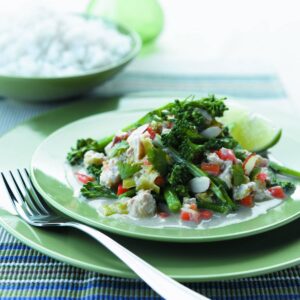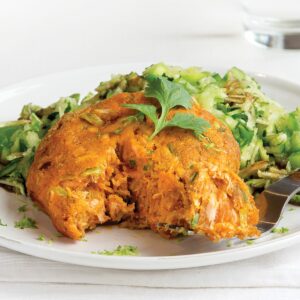
They may be small, but when it comes to nutrition babies’ needs are big. HFG nutritionist and mum Claire Turnbull explains just what under-ones need for their growth and development.
When it’s time for your baby to move onto food in addition to breast milk or formula, it’s important to help them develop healthy taste preferences, learn to manage feelings of hunger and fullness and of course, adopt a healthy relationship with food. As parents know, this can be a real challenge!
Around six months
Starting your baby on solids
By six months, and possibly earlier, your baby will be ready for and need solid food. Though breast milk or formula is still the most important source of nutrition, it’s no longer enough to meet all your baby’s needs.
It’s important not to introduce solid food too early (before four months) because babies’ bodies aren’t ready for solid food and it can also increase the risk of food allergy.
Breastfeeding while introducing solids is ideal as it’s thought this may reduce the incidence of food allergy and coeliac disease. When you start will depend on your baby — when they’re able to hold their head up themselves, if they seem hungry after their milk feed or if they open their mouth when you approach with a spoon. If they’re not ready, they’ll spit the food out. Just wait a few days and try again.
Babies also need to learn how to manage food in their mouths and to swallow; since birth they’ve relied on their sucking reflex. To start with, you only need to give your baby a half to one teaspoon once a day after one of their milk feeds, building up to two or three times a day. Over time, the amount will increase. It’s best to introduce new foods one at a time allowing a couple of days in between. At this stage, it’s more about teaching your baby to manage solids and to swallow, rather than providing significant amounts of nutrients.
It’s essential that foods don’t have any added salt as your baby’s kidneys simply can’t handle it. It’s also important not to add sugar, honey or other sweeteners. Honey shouldn’t be given before 12 months as there is a small risk of infant botulism.
Ideal first foods
- Baby rice, mixed with a little breast milk or formula, is great as it’s fortified with iron.
- Fruits and vegetables made into a smooth purée (sieve after blending if necessary).
- Breast milk and formula are quite sweet so sweeter vegetables such as carrots, pumpkin and kumara might go down better at first.
The importance of iron
Babies are born with enough iron to last them around six months, but from then on, iron-rich foods are crucial. Iron is essential for healthy growth, brain development and a strong immune system and believe it or not, your baby needs more iron at seven months than a grown man!
Baby rice is fortified with iron, so it’s a great first food option, along with puréed fruit and vegetables, puréed meat, fish and chicken, plus lentils and legumes. Initially, you may want to sieve these to make sure they’re really smooth. It’s also a good idea to add a couple of tablespoons of puréed red meat several times a week to make sure your baby is getting enough iron.
Other ways to boost iron are to cook and freeze liver (eg chicken liver) and grate a little frozen liver into your baby’s food —10g (2-3 teaspoons) a week is enough as it’s very high in vitamin A and too much can be toxic. If your baby is vegetarian, it’s essential to include iron-rich alternatives. Your GP can help you to monitor your baby’s iron level.
- NOTE: 80% of toddlers in New Zealand don’t get the recommended daily intake of iron.
Around seven months
Moving onto mash
At this age, your baby will be ready to move from smooth purées to thicker foods or mash. You can still purée meat, chicken and fish but veges and fruit can be lumpier. Again, this needs to be offered after milk feeds. The amount your baby eats will vary, so let their hunger guide you.
It’s tempting to keep your baby on fruit purées (because they love them!), but try to include a wide variety of foods including vegetables, meat, fish and chicken.
At this stage you can also try eggs (scrambled works well) as well as yoghurt and cottage cheese. You can also add grated cheese to food and use a little cow’s milk — add a splash to breakfast or make a cheese sauce or rice pudding (sweeten with fruit rather than sugar). Use full-fat dairy products at this age.
This is also when babies can be encouraged to hold onto food and start chewing. After a feed of mashed/lumpy food, you can hand them soft-cooked vegetables such as carrots or courgettes to chew on. They may also like a slice of banana or avocado (but be prepared for it to go everywhere!). Remember, always supervise a baby while they are eating in case they gag or start to choke.
Around eight months
Progressing to finger food
This is when things really start to change! Food will be providing lots of nutrition and now’s the time to offer it before milk. At this stage, your baby will be chewing and biting, wanting to pick up food (even if they miss their mouths!) and be interested in a variety of tastes and textures. As they progress, they’ll be able to manage finger foods and start to feed themselves.
You can start to offer baby-friendly versions of family food including onion, garlic and small amounts of mild herbs and spices (eg cinnamon), but without any additional salt, sugar or honey.
Aim for three meals a day; from around 9-10 months you may find your baby is hungry for one or two snacks each day as well, but this will depend on their appetite and how much they eat at mealtimes.
From nine months
Try these meal and snack ideas:
Breakfast
- Baby rice or rolled oats (cooked) with formula/breast milk/cow’s milk and fruit
Lunch
- Scrambled egg with small bite-sized toast pieces with avocado
- Pasta shapes with homemade cheese sauce (without added salt)
- Cottage cheese or grated cheese with vegetables
Dinner
- Mince (finely minced) and rice with bite-sized pieces of well-cooked (soft) vegetables such as carrot, broccoli or courgette
- Fish/tofu/tempeh with mashed kumara or steamed kumara wedges, peas and carrots
- Beef casserole (slow cooked so it’s very soft and tender) with vegetables and potato (made without salt or stock). You’ll still need to chop up the meat, even after cooking
Snacks
- Chopped boiled egg
- Small cubes or thin slices of cheese
- Mashed or puréed fruit
- Unsweetened yoghurt
- Slices of banana and other soft fruits (skin removed)
- Peanut butter (smooth without salt or sugar) on toast or bread in mini bite-sized pieces
- Mini meatballs or tender-cooked meat chopped into bite-size pieces
Commercial baby foods
Jars and pouches of shop-bought food are handy when you’re on the move, but they don’t provide the textures and meat (and therefore the iron) your baby needs. Best to keep these to occasional use.
Around 12 months
By now, the majority of your baby’s nutrition should come from solid food, ideally in three meals a day plus healthy snacks and fluids. The best drink is breast milk and/or full-fat cow’s milk, plus water.
Your little one may love milk but don’t offer more than 500ml of cow’s milk each day to ensure they are hungry for other nutrient-rich foods, especially those with iron.
It’s best to avoid fruit juice, cordial, fizzy drink or flavoured milks as they may encourage a preference for sweet food and could cause damage to their teeth.
Now is a good time to include small portions of meals that the rest of the family are eating, including a variety of spoon-fed and finger foods. Your toddler may want to take control of the spoon and feed themselves — this is messy, but it’s an important skill to learn.
Introducing foods which might cause an allergic reaction
There are many factors that contribute to the likelihood of a baby developing food allergy. It was once thought the delayed introduction of potentially allergenic foods may prevent allergy but there is no evidence that delayed introduction of foods such as egg, milk, peanut, tree nuts or seafood beyond the first four to six months of life reduces the risk of food allergy and eczema. A recent study found that for infants at high risk of peanut allergy, introducing foods containing peanut within their first 11 months, actually helped prevent peanut allergy.
What should my baby drink?
In addition to breast milk and/or formula you can offer water from six months. Whole (full-fat) cow’s milk can be offered from 12 months and reduced-fat milk from two years. Do not give your infant or toddler alcohol, coffee, tea (including herbal teas), drinks containing caffeine (eg energy drinks) or soft drinks and avoid sugary cordials and juice.
Selenium and iodine
Kiwi adults are at risk of an inadequate intake of selenium and iodine (due to the nature of New Zealand soil among other factors), so your baby could be low in these minerals too. If breastfeeding, it is really important you eat foods rich in iodine and selenium, as these will be passed onto your baby. Formulas also contain additional iodine.
It’s also important to feed iodine and selenium-rich foods to your baby. Good sources include meat, chicken, seafood and eggs. As your baby moves onto lumpier foods, you can try grating a third of a Brazil nut into their breakfast (don’t use any more than this). Good sources of iodine include seafood, bread (it contains iodised salt), milk, eggs, meat and seameal custard.
Restrictive diets
Unless your child has been diagnosed with a food allergy or intolerance by a qualified health professional, it is recommended you DO NOT put them on a restrictive diet, particularly if this eliminates whole food groups. You could run the risk of nutritional deficiencies and adversely affecting their relationship with food.
If you have serious concerns about your child’s eating habits or growth and development please speak to a qualified health professional.
Looking after number one
“Help! I’m breastfeeding and seem to be losing too much weight!”
While some mums struggle to shift weight, others find the kilos just drop off. That’s because when you have a baby it’s easy to forget to eat, or you might be too tired to bother. In order to maintain a good milk supply and keep yourself healthy, it’s crucial to make sure you’re eating enough. If you’re losing weight rapidly, try to ensure you’re eating four or five mini meals throughout the day — these can be as simple as breakfast cereal and milk, a homemade smoothie or eggs on toast. Boosting your healthy fats is a good idea; snack on unsalted nuts, eat avocado either by itself or on toast or crackers and use peanut butter liberally. And be generous with the amount of oil you use in your cooking or on a salad, too.
Article sources and references
- Australasian Society of Clinical Immunology and Allergy. 2010. Allergy prevention in children Available at www.allergy.org.auhttps://www.allergy.org.au/
- Butte NF et al. 2000. Energy requirements derived from total energy expenditure and energy deposition in the first two years of life. American Journal of Clinical Nutrition 72:1558-6https://www.ncbi.nlm.nih.gov/pubmed/11101486
- Ministry of Health. 2008. Food and Nutrition Guidelines for Healthy Infants and Toddlers (Aged 0-2): A background paper. 4th ed. Partially Revised December 2012. Wellington: Ministry of Healthhttps://www.health.govt.nz/system/files/documents/publications/food-and-nutrition-guidelines-healthy-infants-and-toddlers-revised-dec12.pdf
- The LEAP study www.leapstudy.co.uk Wall CR et al. 2008. Ethnic variance in iron status: is it related to dietary intake? Public Health Nutrition 12:1413-21http://www.leapstudy.co.uk/
- WHO, UNICEF (United Nations Children’s Fund). 1998. Complementary Feeding of Young Children in Developing Countries: A review of current scientific knowledge. Geneva: World Health Organizationhttps://apps.who.int/iris/bitstream/handle/10665/42739/924154614X.pdf;jsessionid=6742C69F61CB2CD00DE0E885FF57FE6C?sequence=1
www.healthyfood.com











